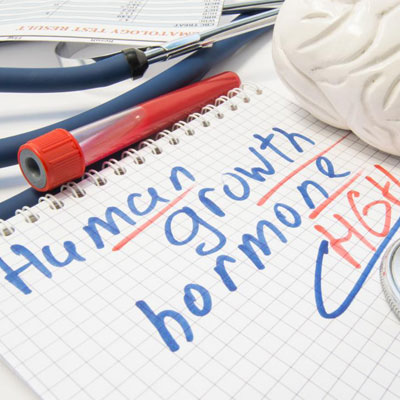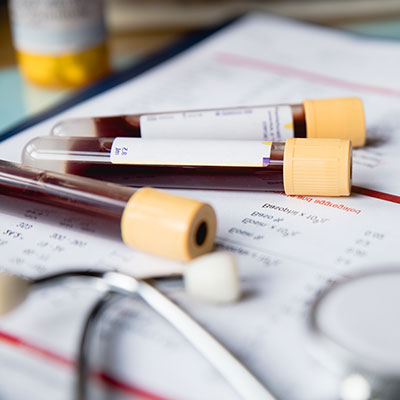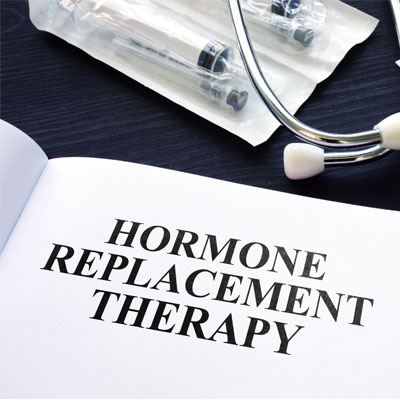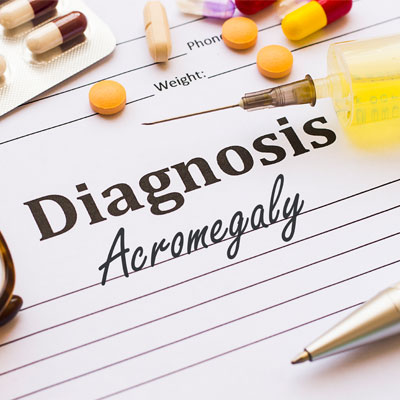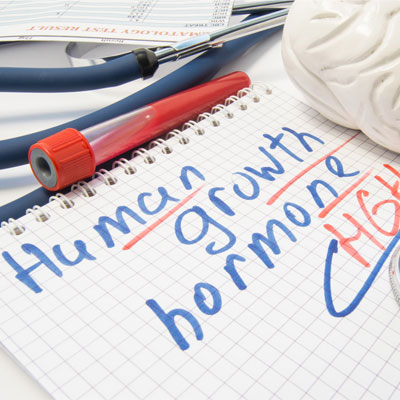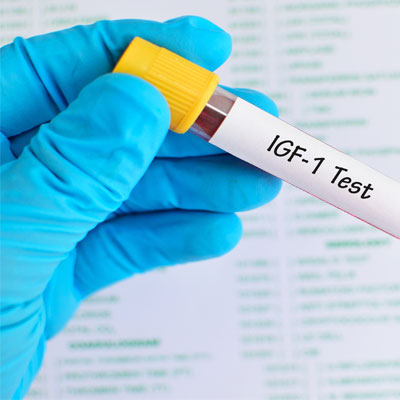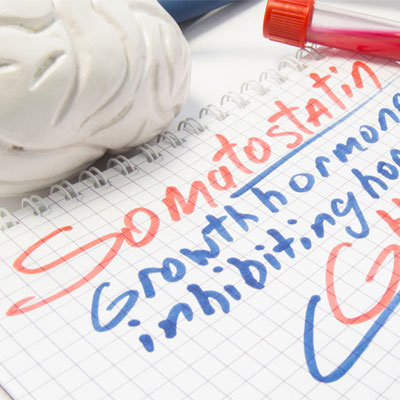Contents
- What Does it Mean to Have Hypersecretion of Human Growth Hormone?
- What Are the Symptoms of Hypersecretion of Human Growth Hormone?
- How Does a Doctor Diagnose Hypersecretion of Human Growth Hormone?
- What Can Happen if Hypersecretion of Human Growth Hormone Goes Undiagnosed?
- How Do You Treat Hypersecretion of Human Growth Hormone?
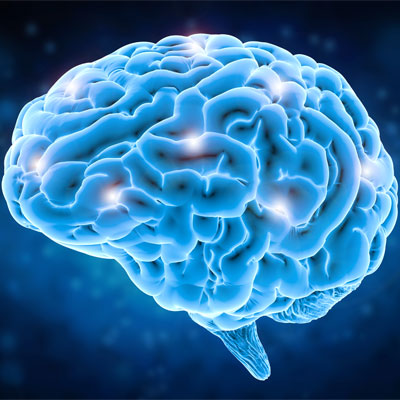
The hormone that signals the somatotrophs into action is growth hormone-releasing hormone (GHRH). Somatostatin is the hormone that inhibits HGH production. Both GHRH and somatostatin come from the hypothalamus.
Sleep, nutrition, exercise, stress, and glucose levels all influence human growth hormone release. We most often hear about a condition called human growth hormone deficiency which occurs when the somatotrophs do not secrete enough HGH.
However, there are also times when an overactive pituitary gland results in too much human growth hormone entering the bloodstream. That is hypersecretion of HGH.
What Does it Mean to Have Hypersecretion of Human Growth Hormone?
When an adult experiences hypersecretion of human growth hormone, it can have an impact on other critical hormone levels. Insulin growth factor 1 is released in direct proportion to the amount of HGH received by the liver. IGF-1 balance is crucial because not only does it support the functions of HGH, but it also helps regulate glucose levels. Too much IGF-1 can also lead to tumor growth. HGH hypersecretion can also lead to increased mortality if undiagnosed.
What Are the Symptoms of Hypersecretion of Human Growth Hormone?
Human growth hormone hypersecretion occurs most often in middle-aged adults. What will hypersecretion of human growth hormone cause to happen?
The symptoms of HGH hypersecretion include:
- Pituitary adenoma (tumor) requires an MRI or CT scan
- Changes in eyesight/visual impairment
- Headaches
- Sleep apnea
- Extruding or enlarged supraorbital ridge
- Lengthening or enlargement of the nose, lips, or jaw
- Enlarged tongue
- Hypertrophy of sebaceous and sweat glands – excessive sweating
- Weakness or fatigue
- Enlarged vocal cords leading to a deepening of the voice
- Galactorrhoea (prolactin) – excessive milk production
- Cardiomegaly hypertension – enlarged heart/high blood pressure
- Abnormal glucose tolerance test – too much glucose in the urine
- Hands and feet taking on a spade shape or swelling to a larger size
- Sexual dysfunction in males
- Abnormal menstrual cycles
- Low libido
- Peripheral neuropathy – numbness and weakness in hands and feet
- Osteoarthritis
Symptoms often occur gradually, making this condition difficult to detect until late in its development. Sometimes, the symptoms of hypersecretion of human growth hormone are influenced by benign tumors of the pituitary gland.
In children, HGH hypersecretion contributes to excessive long bone growth resulting in gigantism.
How Does a Doctor Diagnose Hypersecretion of Human Growth Hormone?
Acromegaly is not one of the first suspect conditions when a person exhibits only a few of the mentioned symptoms. Human growth hormone hypersecretion is a relatively rare disorder.
A glucose tolerance test is one of the primary methods of assessing this condition. Diagnosis of hypersecretion of human growth hormone consists of drinking a sugary beverage and measuring growth hormone levels over a few hours. Both glucose and IGF-1 levels are checked for an accurate diagnosis. Sugar normally causes a decrease in HGH secretion. Individuals with acromegaly will not experience that decline. As such, both their HGH and IGF-1 levels will remain high.
If the blood tests show elevated IGF-1 levels, the doctor will likely order an MRI (magnetic resonance imaging) scan of the brain to check for a tumor.
The diagnosis of HGH hypersecretion required the following three factors:
- Physical symptoms and changes associated with acromegaly
- Blood test results confirming elevated hormone levels
- Diagnostic scans to determine if a tumor is present – one may also be in the hypothalamus, stomach, or chest and contribute to changes in HGH secretion
What Can Happen if Hypersecretion of Human Growth Hormone Goes Undiagnosed?
The most common condition caused by hypersecretion of human growth hormone is acromegaly. Individuals with acromegaly experience enlargement of the internal organs, hands, feet, and jaw bones. Altered facial features are often a telltale sign of acromegaly.
Trusted sourceCarpal Tunnel SyndromeOrthoInfoGo to sourceCarpal tunnel syndrome may occur as the hands become enlarged. Joint pain is a common complication of hypersecretion of human growth hormone in adults.
Other issues that could occur if HGH hypersecretion goes undiagnosed is related to the mouth where an overgrowth of the jaw can lead to increased space between the teeth.
Patients dealing with untreated acromegaly are at an increased risk of the following health concerns:
- Type 2 diabetes
- Osteoarthritis
- High blood pressure
- Cardiovascular disease
- Cardiomyopathy
- Bowel polyps that can develop into cancer
How Do You Treat Hypersecretion of Human Growth Hormone?
An accurate diagnosis is vital to the proper treatment of hypersecretion of human growth hormone. If a tumor is the cause, then the doctor may order surgery, radiation, medication therapy, or a combination approach.
Here is a closer look at the treatment options:
- Surgery to remove the tumor often provides the quickest recovery from HGH hypersecretion. The typical procedure is transsphenoidal surgery which requires an incision at the back of the nose to remove the tumor from the pituitary gland.
- Radiation (radiotherapy) can be utilized if the tumor is not in a place allowing doctors easy removal. Also, radiation is sometimes used if there is any remaining tissue left from the tumor that doctors were unable to remove during the surgery.
- Medication therapy to treat HGH hypersecretion may use one of the following three types of drugs:
- Dopamine agonists – bromocriptine may help lower HGH secretion but causes multiple side effects, including headaches, nausea, and dizziness. A better option is cabergoline which shows improved results with fewer adverse reactions.
- Growth hormone receptor antagonists – medications such as pegvisomant inhibit HGH action rather than secretion. It interferes directly with the GH receptor. The treatment is well-tolerated and remarkably effective.
- Somatostatin analogs – assist in the inhibiting of HGH release by activating somatostatin receptors in the pituitary gland. This is often the first option for treatment due to positive studies showing reduced tumor size and improved biochemical parameters. Side effects are usually mild and may include abdominal discomfort, diarrhea, nausea, and gallstones.
For additional information, please contact our hormone clinic for a complimentary consultation.
- J Ayuk, M C Sheppard.
- Man Lu, Doctor of Philosophy, Jack U. Flanagan, Dr., Ries J. Langley, MSc, PhD., Michael P. Hay, BSc (Hons), PhD., Jo K. Perry, PhD, BSc (Hons).
- Jan A. Mol, Björn P. Meij, PhD., Associate professor.
Growth hormone and its disorders
Targeting growth hormone function: strategies and therapeutic applications

